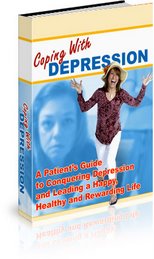Faye B. Roberts
Treatment for childhood depression varies. What works for one child may not necessarily work for another. The first and most important step is finding a child psychiatrist to evaluate and treat a depressed child. A child psychiatrist has received specialized training in diagnosing and treating psychiatric disorders in children. Other health care practitioners including family doctors and pediatricians may have taken a course in child psychiatry, but a great majority are not experts in the field.
As a general rule, with mild to moderate depression, one first tries psychotherapy. This may include family therapy to help the members of the family understand what the depressed child is experiencing. It has been shown that family therapy can speed recovery and help prevent a relapse. Discussions with your health care provider can help you determine which psycho therapeutic method is best suited for your child.
Studies have shown that treatment for childhood depression using cognitive-behavioral therapy may work the fastest, but the child's psychiatrist will determine which method is best. Cognitive therapy works by helping a child examine and correct negative thought patterns and erroneous negative assumptions about them self. Behaviorally, it encourages the child to use positive coping behaviors instead of avoiding situations or giving up. When therapy has been completed, the child may benefit from scheduled or "as-needed" booster sessions.
If therapy does not produce enough improvement then an anti-depressant may be added to the regime. Again, this depends on the degree of the depression. If it is severe depression or there is serious acting out your health care provider may start medication at the beginning of the treatment.
The medical treatment of child and adolescent depression using SSRIs (Selective Serotonin Reuptake Inhibitors -- Prozac, Zoloft, Lexapro, etc.) has proven very beneficial. The side effects of SSRIs are not as annoying as those of the older medications and are less toxic in overdoses. Compared to adults, adolescents are a bit more likely to become agitated or to develop a mania while taking an SSRI. The doctor should warn you about the symptoms of mania, especially if there is a family history of Bipolar Disorder. If your child has had a manic episode in the past, some doctors will suggest adding a mood stabilizer like Lithium or Depakote.
The treatments for childhood depression vary from child to child. Using psychotherapy, medication, or a combination of both can help your child overcome depression. And the best news of all is that childhood depression can be treated successfully.
-------------------------------------------------------------------------------
Faye B. Roberts is an independent researcher on divorce and the effect it has on the entire family. Find out how to start enjoying your life again. http://www.divorceandyourfamily.info
Thursday, June 14, 2007
Subscribe to:
Post Comments (Atom)



No comments:
Post a Comment